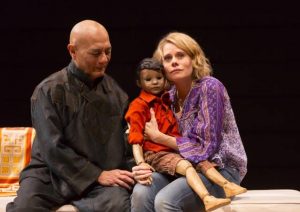
 We sat down with the lovely and wildly prolific Sarah Ruhl to chat about her newest play, The Oldest Boy, now playing through December 28th at Lincoln Center. Arguably the most extoled playwright of the moment, Ruhl is generous with her genius. She tells us about wanting to be a dancer, wanting plays that break her heart, and about how she would revise the old adage, “Write What You Know.” If you are going to listen to anyone about writing, listen to Ms. Ruhl.
We sat down with the lovely and wildly prolific Sarah Ruhl to chat about her newest play, The Oldest Boy, now playing through December 28th at Lincoln Center. Arguably the most extoled playwright of the moment, Ruhl is generous with her genius. She tells us about wanting to be a dancer, wanting plays that break her heart, and about how she would revise the old adage, “Write What You Know.” If you are going to listen to anyone about writing, listen to Ms. Ruhl.
What surprised you most in the writing of The Oldest Boy?
I suppose how it all ended. I mean I wrote the first act and I thought “is she or isn’t she going to give her child away?”- I had no idea. I tend to write plays and not to plan the ending and then it became clear in the writing of it for me. Ultimately the play was about looking at your child and your child’s proclivities and who your child wants to be and seems to be becoming and following their proclivities.
Same question, production?
Going back to this process of trying to find Tsering Dorjee, who is this amazing Tibetan actor and dancer and performer and really community organizer because he teaches Tibetan culture in Berkley. The search for finding him to be part of the production and then the event of having him as part of the production were both incredibly gratifying and led to all kinds of discoveries and surprises in the moment of creating a piece. Because we really crafted different moments. The play is told in three ceremonies, working through those ceremonies and what the actual ritual context was, was incredibly illuminating. I had in my mind this question of how you could tell a story, that was a theater piece and have the audience be watching a narrative unfold with their regular theater-going gaze, and also have ceremony happen and wondering if they could shift that gaze and watch the ceremony differently.
This is one of many collaborations with director Rebecca Taichman. What is it about Rebecca that keeps you coming back?
The thing that I love so much about Rebecca is she has this incredible visual sensibility, like a really pristine and beautiful sensibility. And that’s always been true from the moment I first worked with her. She did The Clean House in Washington DC at Wooly Mammoth. I saw the production and I didn’t work with her on it, but watching the production and I was like, “ Oh my God, she read my mind.” It was exactly how I imagined it. And so married to this incredible visual sense, she also just has a huge heart and a huge capacity for working with others in a really loving way. Because she loves writers and designers so much, she gives them a lot of latitude, and a lot of respect and space in a collaboration. And when you are working on a new play that is so essential.
 What was the rehearsal process like?
What was the rehearsal process like?
It was great and in some ways it was different to other processes that I had. We started each day by meditating. So we meditated every day for five minutes and then we began. And the other thing that was really different about the process was that we had a puppet to work with. Puppet choreography is incredibly different from scene work that you do with live humans. With live humans you really are improvising moment to moment and then setting the blocking. But with a puppet, it’s three people on a puppet. Every moment you have to say “ok, here’s how we are going to try to achieve a puppet eating cereal.” You’re trying to get these three people to move as one person and express the point of view and acting with the puppet. Really intricate and detail oriented and it takes a while for the spontaneity to emerge from the choreography. In some ways I was amazed we were able to mount a production in the normal amount of time with a Bunraku puppet, in the round, with Tibetan dancing and singing, and with non-Tibetans learning Tibetan language and ritual. It’s amazing.
What’s the best piece of advice you have heard in regards to writing?
One of my favorites, that a teacher of mine, Maria Irene Fornes once said to me was in terms of actor objectives and focusing too much on what the character wants. Fornes said, “Who always wants something from someone else? Only Americans and criminals.” Which I love. And really she was trying to put the emphasis on something else, I think she’s trying to remind us to put the emphasis on moments of communion and grace among people and not to put the emphasis on people trying to get things from each other . The other advice is from Paula Vogel, she once told me about her play Baltimore Waltz. She told me, “ If I had sat down and tried to write a play about my brother who died of aids, I would never have gotten out of bed because I was so sad.” And she said, “ I had to look at it indirectly. I had to write about a kindergarten teacher going on an imaginary trip with her brother to Europe and then I could write about my brother who died of aids.” I think in a play like Eurydice, where I wrote about my dad, but it was in the afterlife and through the lens of a Greek myth or even this play which ostensibly seems far from my reality because part of it takes place in another country, and there‘s a Bunraku puppet in the living room so there’s a level of abstraction, but really I’m grappling with the predicament of motherhood.
Worst piece of advice?
No one has ever asked me that. One thing that comes to mind, and this isn’t a terrible piece of advice, but it is a problematic piece of advice is, write what you know. It’s pervasive and it’s kind of a stock answer. And what perturbs me about it is that it’s hard to even know what we know. How do we even know what we know, how do we know what we know fully, and sometimes how we know what we know is to go outside of ourselves. We write outside of our gender, we write outside of our culture sometimes, but almost always we write outside of our stories, and write about mythologies that are much larger than us which we also know in effect. A part of me wants to revise that advice and say, expand what you know.
The Oldest Boy deals with reincarnation. What would you come back as in your next life?
I think I might like to be a dancer. I’m such a sedentary creature, I sit around writing all the time. It would be so fun to be able to dance and to leap through the air and move around all day and have a sense of joy moving around all day. I have a sense of joy watching other people move around.
What would you like to see more of in theater?
More plays that break my heart, more plays that look like the world we live in terms of diversity. Those are two big ones. I would like to see stories that reimagine our notion of a traditional protagonist and our ideas of a traditional Aristotelian arc. And stories that really ask us to be in the room with each other in a spirited kind of a way.
What would you tell baby Ruhl?
One of my favorite quotes is not me, but Rilke. Be patient of all that’s inside of yourself and try to love the questions. And I think for a playwright and a human being loving the questions is a helpful place to be and then you eventually live your way into the answer.